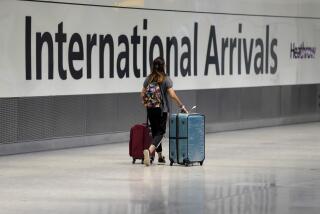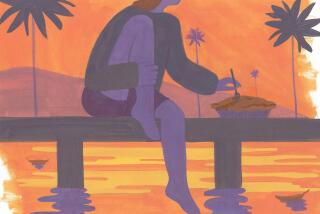Disenchantment tags along, even in enchanting lands
- Share via
I recently saw two women in a Paris cafe leafing through guidebooks that gave them away as English-speaking tourists sampling the raptures of the City of Light. But you wouldn’t know it from their tired, disenchanted demeanors.
I love to talk to tourists, but this time I just watched and wondered why they didn’t seem happier. Were they friends who had found they didn’t travel well together? Had the chill, gray, damp of a Paris winter gotten to them? Were they coming down with colds? Were they jet lagged, menopausal, obsessing over the cost of the trip?
I never found out. But seeing them reminded me of an ugly little truth about travel that people rarely discuss: The trips we come home raving about and enshrine in photo albums aren’t always pure minute-by-minute bliss.
Unmet expectations may be partly to blame because few places and experiences can match the tourist brochure hype. Your charming and cozy hotel has no hot water; the food is delicious, but the waiter is rude; the edgy adventure trip turns out to be safe enough for 6-year-olds.
When you’re heading off on an African safari or Himalayan trek, it’s hard not to have hopes so high they can never be met.
Sometimes it seems that the more romantic the destination, the greater potential for disenchantment. I had a better time in Paris just after a divorce than I did my first time there, which was on my honeymoon.
“We’ll always be disappointed if we believe that we can plan for a peak experience and make it happen,” clinical psychologist Harriet Lerner, author of “The Dance of Anger,” wrote to me in an e-mail. “True joy can’t be anticipated or planned. It just strikes.”
Many factors keep it from striking, though, including travel companions who annoy, embarrass or depress you. They may be best friends, lovers or adorable kids when you’re at home, or they may be strangers you bunk with on tours or cruises to avoid paying a single surcharge, or they may even be second-choice travel mates who are with you because a preferred companion couldn’t come along.
Travel requires constant decision-making, but people have different styles and agendas, causing friction when one person has to compromise on what to see, where to eat, when to go to bed. Children can get grouchy or bored or behave badly.
Couples who take trips to rekindle their relationships sometimes find themselves fighting over the same issues that plague them at home. In the funny and touching 1967 movie “Two for the Road,” Audrey Hepburn and Albert Finney play a married couple trying to stave off divorce by returning to the Loire Valley chateau where they fell in love.
All of which argues for limiting your travel companions to people you know well and for discussing possible problems long before you pack your bags.
Still, I’ve come to believe that travel inevitably intensifies the elements in a person’s nature, making their good and bad qualities stand out more sharply. Recognizing this potential for discord can make travelers be more tolerant and forgiving, smoothing rough patches.
Furthermore, mood is connected to physical well-being, doctors and psychologists say, so if you don’t feel well, it’s hard to have fun. You can grit your teeth and push on, but it’s an uphill battle. For this reason, I become a near-hypochondriac before and during a big trip, taking mega-vitamins to support my immune system, staying alert for signs of illness and traveling with a well-stocked medical kit.
Even if you manage to avoid such common travel complaints as the sniffles, you may have to contend with jet lag. It can make long weekends in places many times zones away abysmal and suck the pleasure out of even the dreamiest destinations.
After flying from L.A. to St. Petersburg, Russia, several years ago, I felt as though I was in a black hole for most of my stay. Jet lag, not the elegant Russian cultural capital on the Neva River, was to blame.
The symptoms of jet lag include mood disturbance, insomnia and gastrointestinal dysfunction, according to the National Sleep Foundation, which is based in Washington, D.C. Insomnia is especially troublesome in hotel rooms far from home, where there’s nothing to do but watch TV in a language you don’t understand or read and count sheep while thinking how wretched you’re going to feel the next morning on your one and only visit to the Hermitage.
I’ve tried many jet-lag remedies, including massages, melatonin and stints in sensory deprivation tanks. But nothing works for me, except planning itineraries that give me time to take it easy for the first few intensely jet-lagged days of a trip.
Weather also can affect mood, be it sun deprivation in dour, rainy places such as London or stultifying heat in South Africa and Mexico’s Yucatan. You can’t do anything about the climate, so it’s best to embrace it, I think. I went to St. Petersburg in January partly to find out what the city is like under the thumb of -- as they call it there -- Gen. Winter and found it a white-coated enchantment, jet lag notwithstanding.
My old friend Toni Neubauer, founder of Myths and Mountains, a cultural tour company based in Incline Village, Nev., reminded me that travelers get depressed for other reasons, including ethnocentrism and unrecognized emotional baggage. She thinks some people are afraid of being cheated and not getting their money’s worth or they worry about being American in a world increasingly antagonistic to U.S. policies. Moreover, some Americans tend to be insensitive to different modes of behavior in places beyond U.S. borders and they lack foreign language skills, making them uncomfortable in non-English-speaking nations.
Above all, American travelers sometimes feel unsettled when they confront different sets of priorities. “For example,” Neubauer wrote in an e-mail, “they arrive in a country where the restaurant only has two burners and everything is cooked to order. The rice may arrive a half-hour after the meat or soup. They don’t understand.”
Don’t fight it, I say. And know before you go, because anticipating such potential travel downers as unmet expectations, ill health, challenging weather and tardy rice helps travelers face and deal with them.
More important, try to be open to transcendent travel moments when they occur. Watch South African rhinos wallowing in the mud and storm clouds brewing on the north coast of Canada’s Queen Charlotte Islands with all your senses finely tuned. Joy often strikes, but you have to be ready for it.
*
Susan Spano also writes “Postcards From Paris,” which can be read at latimes.com/susanspano.
More to Read
Sign up for The Wild
We’ll help you find the best places to hike, bike and run, as well as the perfect silent spots for meditation and yoga.
You may occasionally receive promotional content from the Los Angeles Times.






